福建省四地六校2015-2016学年高二英语上学期第三次联考(12月)试题
- 格式:doc
- 大小:162.50 KB
- 文档页数:18
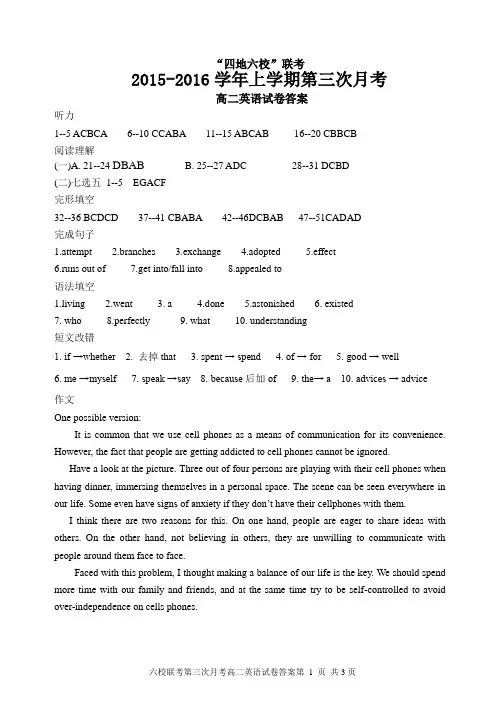
“四地六校”联考2015-2016学年上学期第三次月考高二英语试卷答案听力1--5 ACBCA 6--10 CCABA 11--15 ABCAB 16--20 CBBCB阅读理解(一)A. 21--24 DBAB B. 25--27 ADC 28--31 DCBD(二)七选五1--5 EGACF完形填空32--36 BCDCD 37--41 CBABA 42--46DCBAB 47--51CADAD完成句子1.attempt2.branches3.exchange4.adopted5.effect6.runs out of7.get into/fall into8.appealed to语法填空1.living2.went3. a4.done5.astonished6. existed7. who 8.perfectly 9. what 10. understanding短文改错1. if →whether2. 去掉that3. spent →spend4. of → for5. good→ well6. me →myself7. speak →say8. because后加of9. the→ a 10. advices→ advice作文One possible version:It is common that we use cell phones as a means of communication for its convenience. However, the fact that people are getting addicted to cell phones cannot be ignored.Have a look at the picture. Three out of four persons are playing with their cell phones when having dinner, immersing themselves in a personal space. The scene can be seen everywhere in our life. Some even have signs of anxiety if they don’t have their cellphones with them.I think there are two reasons for this. On one hand, people are eager to share ideas with others. On the other hand, not believing in others, they are unwilling to communicate with people around them face to face.Faced with this problem, I thought making a balance of our life is the key. We should spend more time with our family and friends, and at the same time try to be self-controlled to avoid over-independence on cells phones.听力原文(Text 1)W: International Shipping, Elaine speaking, may I help you?M:Allan MacFarlane speaking. Could I speak to Bob Harris, please?W: Hold on a moment please, Mr MacFarlane. I'll just put you through.(Text 2)M: The taxi driver must have been driving too fast.W: I don't think so. He crashed into the tree because he was trying to avoid a bicycle in front of him.(Text 3)M: Summer is over at last, it's time to put T shirts away.W: I've been waiting for this for months.(Text 4)W: Can I come to see you at 10:00,Professor Brown?M: I'm sorry, Susan, but I'll be meeting my students then. Why not come half an hour later? (Text 5)M: I telephoned to see if you'd like to go to the movies this afternoon.W: I'd really like to, but I just broke my glasses and I've got to do something about getting another pair before the shop closes.(Text 6)M: Paulanar Restaurant. Head waiter. Good morning.W: I'd like to book a table for two.M: And is that for today, Madam?W: Of course.M: At what time, Madam?W: Oh, about three o'clock, I suppose.M: I'm afraid we only serve lunch till 3 p.m., Madam.W: Oh, well, two o'clock then, and it must be by a window.M: Very good, and your name, please?W: White. Linda White.M: Very good, Mrs. White. A table for two at 2 p. m. today.(Text 7)M: Oh, we still haven't decided what to get him.W: I know. It's hard. What does he need?M: Well, darling, the other day he said that he needed a car.W: Yeah, right. Well, I think that's a little beyond us.M: Yeah, it'd be fun, but it's just a little too expensive.W: There's the usual kind of thing, like a wallet or tie.M: Oh, please, not for his sixtieth. I think we should get him something more expensive than that, don't you? I mean, we want to get something good, something...W: Something unusual?M: Yeah.W: Well, how about a computer? We could get him a computer. That way we could keep in touchon e-mail.M: No, no, no. You know him. He says he's too old to learn how to use a computer. He isn't, of course, but I don't think he'd ever use it.(Text 8)W: Pardon me. Are you familiar with this neighborhood?M: Well, I should be. I've lived here all my life. What are you looking for?W: The Post Office.M: Well, the nearest one is about a mile away.W: Oh. Well, I guess I could send a letter.M: There's a mail box up the street. Have you already got a stamp on that letter?W: Yes, I have to register it. How do I walk to the post office from here?M: Go up this street until you get to the main street. Then turn right and walk about four blocks or so.W: Thank you for your help.M: The post office entrance is inside a building complex with some other offices.W: I'm sure I'll find it. If I get lost, I'll ask again.M: There's an American flag out front, and a sign: The U. S.Post Office.W: Thanks again. Bye.(Text 9)M: Hotlines are very common in today's life, do you think so?W: Of course.M: Most of them are about amusement, in my opinion. But some of them are very important in our daily life.W: Is that true?M: Certainly. A free hotline offering help to teenagers was opened in Guangdong.W: Can you tell me something more about it?M: It is the first part of the national hotline system to help to protect teens' rights. Young people who have psychological problems or questions on legal issues can call for help. More than 100 experts are ready to offer help.W: Then what is the telephone number?M: Call 12355 if you are in Guangzhou and 020-12355 if you are outside.W: Oh, it will be a help to teenagers.(Text 10)BEIJING( Associated Press) !China has a growing middle class, a tradition of expecting education and 21 million new babies every year. Selling educational toys should be easy.While China may be the world's biggest toy-maker, much of the best is exported. Department stores here do not have enough high-quality toys. It is said the demand for educational toys is low. A US company, BabyCare, is trying to change that with a new way to sell toys in China. BabyCare works basically together with doctors in Beijing hospitals. People who join the company's mother's club get lectures and newsletters on baby and child development at no extra cost—if they agree to spend 18 dollars a month on the company's educational toys and childcare books.“四地六校”联考2015-2016学年上学期第三次月考高二英语试卷答案听力1--5 ACBCA 6--10 CCABA 11--15 ABCAB 16--20 CBBCB阅读理解(一)A. 21--24 DBAB B. 25--27 ADC 28--31 DCBD(二)七选五1--5 EGACF完形填空32--36 BCDCD 37--41 CBABA 42--46DCBAB 47--51CADAD完成句子1.attempt2.branches3.exchange4.adopted5.effect6.runs out of7.get into/fall into8.appealed to语法填空1.living2.went3. a4.done5.astonished6. existed7. who 8.perfectly 9. what 10. understanding短文改错1. if →whether2. 去掉that3. spent →spend4. of → for5. good→ well6. me →myself7. speak →say8. because后加of9. the→ a 10. advices→ advice作文One possible version:It is common that we use cell phones as a means of communication for its convenience. However, the fact that people are getting addicted to cell phones cannot be ignored.Have a look at the picture. Three out of four persons are playing with their cell phones when having dinner, immersing themselves in a personal space. The scene can be seen everywhere in our life. Some even have signs of anxiety if they don’t have their cellphones with them.I think there are two reasons for this. On one hand, people are eager to share ideas with others. On the other hand, not believing in others, they are unwilling to communicate with people around them face to face.Faced with this problem, I thought making a balance of our life is the key. We should spend more time with our family and friends, and at the same time try to be self-controlled to avoid over-independence on cells phones.。
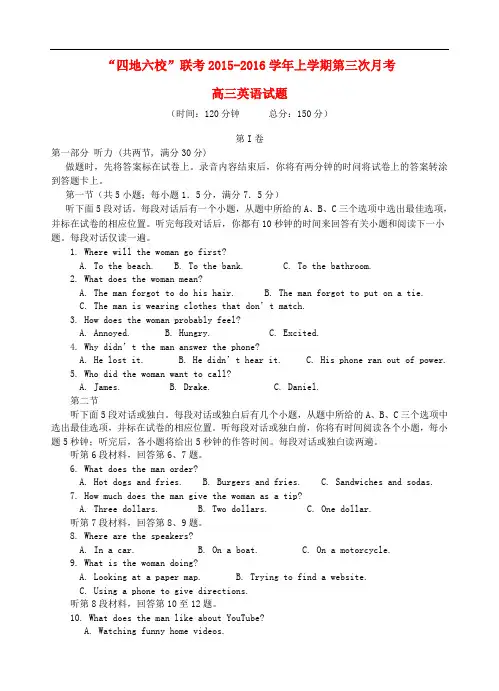
“四地六校”联考2015-2016学年上学期第三次月考高三英语试题(时间:120分钟总分:150分)第I卷第一部分听力 (共两节, 满分30分)做题时,先将答案标在试卷上。
录音内容结束后,你将有两分钟的时问将试卷上的答案转涂到答题卡上。
第一节(共5小题;每小题1.5分,满分7.5分)听下面5段对话。
每段对话后有一个小题,从题中所给的A、B、C三个选项中选出最佳选项,并标在试卷的相应位置。
听完每段对话后,你都有10秒钟的时间来回答有关小题和阅读下一小题。
每段对话仅读一遍。
1. Where will the woman go first?A. To the beach.B. To the bank.C. To the bathroom.2. What does the woman mean?A. The man forgot to do his hair.B. The man forgot to put on a tie.C. The man is wearing clothes that don’t matc h.3. How does the woman probably feel?A. Annoyed.B. Hungry.C. Excited.4. Why didn’t the man answer the phone?A. He lost it.B. He didn’t hear it.C. His phone ran out of power.5. Who did the woman want to call?A. James.B. Drake.C. Daniel.第二节听下面5段对话或独白。
每段对话或独白后有几个小题,从题中所给的A、B、C三个选项中选出最佳选项,并标在试卷的相应位置。
听每段对话或独白前,你将有时间阅读各个小题,每小题5秒钟;听完后,各小题将给出5秒钟的作答时间。
每段对话或独白读两遍。
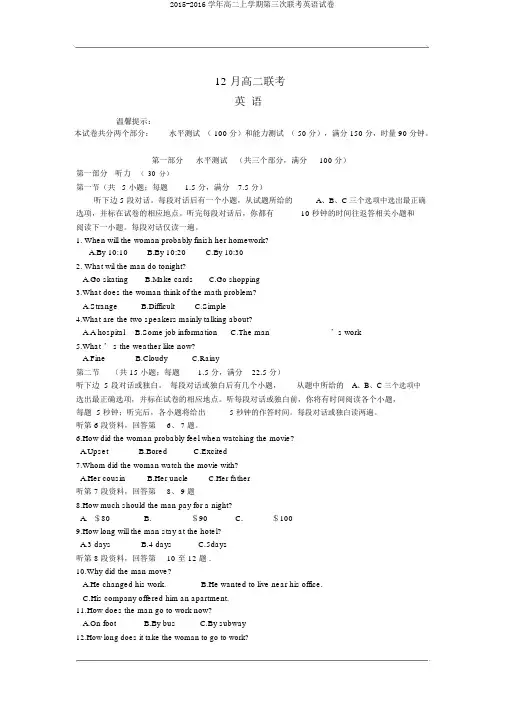
12月高二联考英语温馨提示:本试卷共分两个部分:水平测试( 100 分)和能力测试( 50 分),满分 150 分,时量 90 分钟。
第一部分水平测试(共三个部分,满分100 分)第一部分听力(30分)第一节(共 5 小题;每题 1.5 分,满分7.5 分)听下边 5 段对话。
每段对话后有一个小题,从试题所给的A、B、C 三个选项中选出最正确选项,并标在试卷的相应地点。
听完每段对话后,你都有10 秒钟的时间往返答相关小题和阅读下一小题。
每段对话仅读一遍。
1. When will the woman probably finish her homework?A.By 10:10B.By 10:20C.By 10:302. What wil the man do tonight?A.Go skatingB.Make cardsC.Go shopping3.What does the woman think of the math problem?A.StrangeB.DifficultC.Simple4.What are the two speakers mainly talking about?A.A hospitalB.Some job informationC.The man’s work5.What ’ s the weather like now?A.FineB.CloudyC.Rainy第二节(共 15 小题;每题 1.5 分,满分22.5 分)听下边 5 段对话或独白。
每段对话或独白后有几个小题,从题中所给的A、B、C 三个选项中选出最正确选项,并标在试卷的相应地点。
听每段对话或独白前,你将有时间阅读各个小题,每题 5 秒钟;听完后,各小题将给出 5 秒钟的作答时间。
每段对话或独白读两遍。
听第 6 段资料,回答第6、 7 题。
6.How did the woman probably feel when watching the movie?A.UpsetB.BoredC.Excited7.Whom did the woman watch the movie with?A.Her cousinB.Her uncleC.Her father听第 7 段资料,回答第8、 9 题8.How much should the man pay for a night?A.$80B.$90C.$1009.How long will the man stay at the hotel?A.3 daysB.4 daysC.5days听第 8 段资料,回答第10 至 12 题 .10.Why did the man move?A.He changed his work.B.He wanted to live near his office.C.His company offered him an apartment.11.How does the man go to work now?A.On footB.By busC.By subway12.How long does it take the woman to go to work?A.Twenty minutesB.Half an hourC.An hour听第 9 段资料,回答第13 至 16 题。
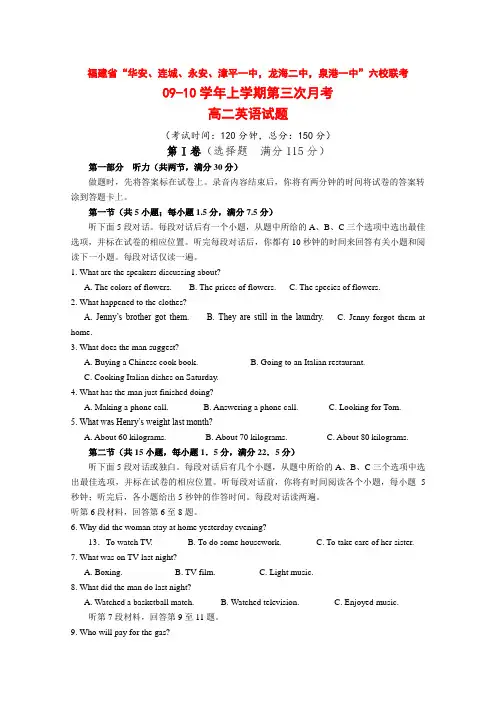
福建省“华安、连城、永安、漳平一中,龙海二中,泉港一中”六校联考09-10学年上学期第三次月考高二英语试题(考试时间:120分钟,总分:150分)第I卷(选择题满分115分)第一部分听力(共两节,满分30分)做题时,先将答案标在试卷上。
录音内容结束后,你将有两分钟的时间将试卷的答案转涂到答题卡上。
第一节(共5小题;每小题1.5分,满分7.5分)听下面5段对话。
每段对话后有一个小题,从题中所给的A、B、C三个选项中选出最佳选项,并标在试卷的相应位置。
听完每段对话后,你都有10秒钟的时间来回答有关小题和阅读下一小题。
每段对话仅读一遍。
1. What are the speakers discussing about?A. The colors of flowers.B. The prices of flowers.C. The species of flowers.2. What happened to the clothes?A. Jenny’s brother got them.B. They are still in the laundry.C. Jenny forgot them at home.3. What does the man suggest?A. Buying a Chinese cook book.B. Going to an Italian restaurant.C. Cooking Italian dishes on Saturday.4. What has the man just finished doing?A. Making a phone call.B. Answering a phone call.C. Looking for Tom.5. What was Henry’s weight last month?A. About 60 kilograms.B. About 70 kilograms.C. About 80 kilograms.第二节(共15小题,每小题1.5分,满分22.5分)听下面5段对话或独白。
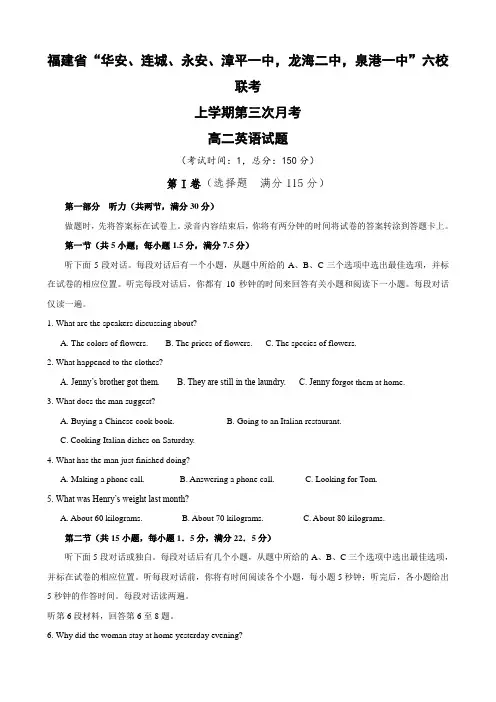
福建省“华安、连城、永安、漳平一中,龙海二中,泉港一中”六校联考上学期第三次月考高二英语试题(考试时间:1,总分:150分)第I卷(选择题满分115分)第一部分听力(共两节,满分30分)做题时,先将答案标在试卷上。
录音内容结束后,你将有两分钟的时间将试卷的答案转涂到答题卡上。
第一节(共5小题;每小题1.5分,满分7.5分)听下面5段对话。
每段对话后有一个小题,从题中所给的A、B、C三个选项中选出最佳选项,并标在试卷的相应位置。
听完每段对话后,你都有10秒钟的时间来回答有关小题和阅读下一小题。
每段对话仅读一遍。
1. What are the speakers discussing about?A. The colors of flowers.B. The prices of flowers.C. The species of flowers.2. What happened to the clothes?A. Jenny’s brother got them.B. They are still in the laundry.C. Jenny fo rgot them at home.3. What does the man suggest?A. Buying a Chinese cook book.B. Going to an Italian restaurant.C. Cooking Italian dishes on Saturday.4. What has the man just finished doing?A. Making a phone call.B. Answering a phone call.C. Looking for Tom.5. What was Henry’s weight last month?A. About 60 kilograms.B. About 70 kilograms.C. About 80 kilograms.第二节(共15小题,每小题1.5分,满分22.5分)听下面5段对话或独白。
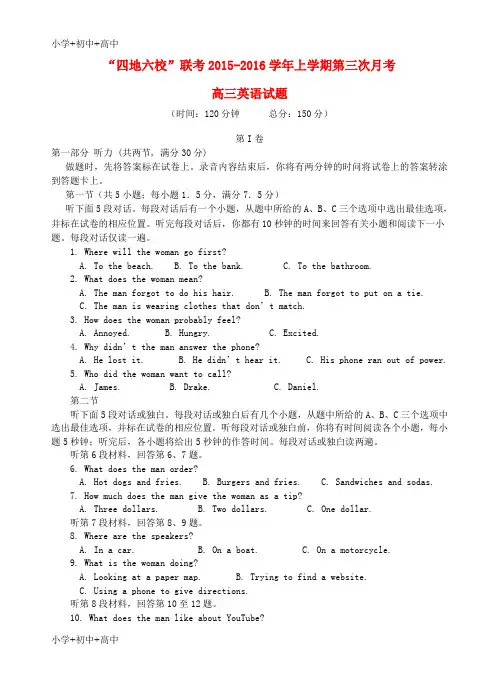
“四地六校”联考2015-2016学年上学期第三次月考高三英语试题(时间:120分钟总分:150分)第I卷第一部分听力 (共两节, 满分30分)做题时,先将答案标在试卷上。
录音内容结束后,你将有两分钟的时问将试卷上的答案转涂到答题卡上。
第一节(共5小题;每小题1.5分,满分7.5分)听下面5段对话。
每段对话后有一个小题,从题中所给的A、B、C三个选项中选出最佳选项,并标在试卷的相应位置。
听完每段对话后,你都有10秒钟的时间来回答有关小题和阅读下一小题。
每段对话仅读一遍。
1. Where will the woman go first?A. To the beach.B. To the bank.C. To the bathroom.2. What does the woman mean?A. The man forgot to do his hair.B. The man forgot to put on a tie.C. The man is wearing clothes that don’t matc h.3. How does the woman probably feel?A. Annoyed.B. Hungry.C. Excited.4. Why didn’t the man answer the phone?A. He lost it.B. He didn’t hear it.C. His phone ran out of power.5. Who did the woman want to call?A. James.B. Drake.C. Daniel.第二节听下面5段对话或独白。
每段对话或独白后有几个小题,从题中所给的A、B、C三个选项中选出最佳选项,并标在试卷的相应位置。
听每段对话或独白前,你将有时间阅读各个小题,每小题5秒钟;听完后,各小题将给出5秒钟的作答时间。
每段对话或独白读两遍。
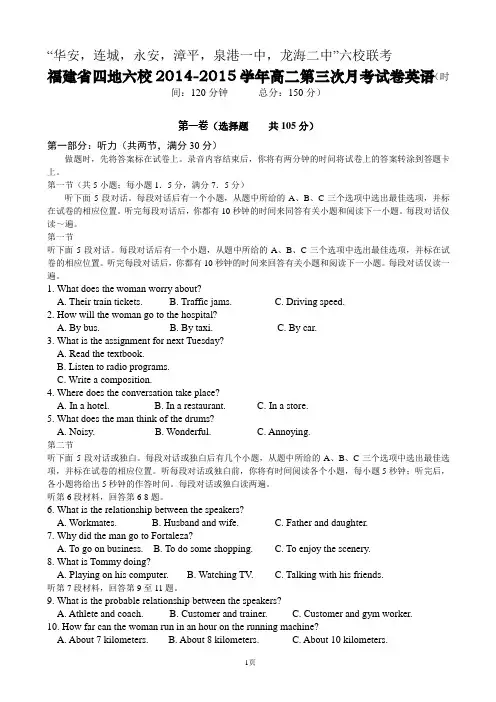
―华安,连城,永安,漳平,泉港一中,龙海二中‖六校联考福建省四地六校2014-2015学年高二第三次月考试卷英语(时间:120分钟总分:150分)第一卷(选择题共105分)第一部分:听力(共两节,满分30分)做题时,先将答案标在试卷上。
录音内容结束后,你将有两分钟的时问将试卷上的答案转涂到答题卡上。
第一节(共5小题;每小题1.5分,满分7.5分)听下面5段对话。
每段对话后有一个小题,从题中所给的A、B、C三个选项中选出最佳选项,并标在试卷的相应位置。
听完每段对话后,你都有10秒钟的时间来同答有关小题和阅读下一小题。
每段对话仅读~遍。
第一节听下面5段对话。
每段对话后有一个小题,从题中所给的A、B、C三个选项中选出最佳选项,并标在试卷的相应位置。
听完每段对话后,你都有10秒钟的时间来回答有关小题和阅读下一小题。
每段对话仅读一遍。
1. What does the woman worry about?A. Their train tickets.B. Traffic jams.C. Driving speed.2. How will the woman go to the hospital?A. By bus.B. By taxi.C. By car.3. What is the assignment for next Tuesday?A. Read the textbook.B. Listen to radio programs.C. Write a composition.4. Where does the conversation take place?A. In a hotel.B. In a restaurant.C. In a store.5. What does the man think of the drums?A. Noisy.B. Wonderful.C. Annoying.第二节听下面5段对话或独白。
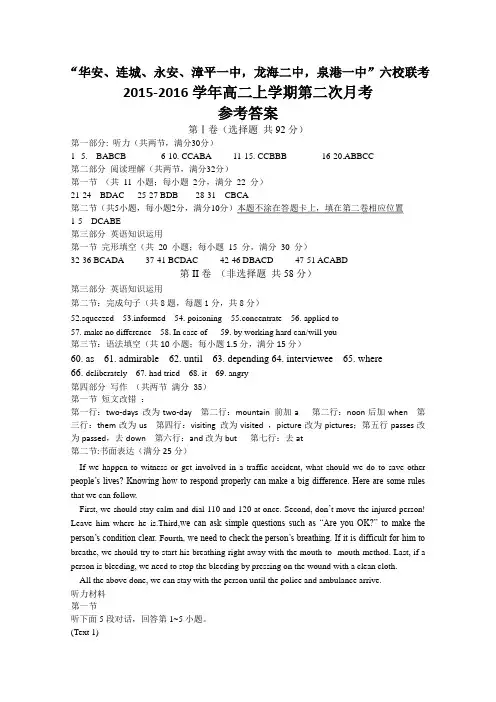
“华安、连城、永安、漳平一中,龙海二中,泉港一中”六校联考2015-2016学年高二上学期第二次月考参考答案第Ⅰ卷(选择题共92分)第一部分: 听力(共两节,满分30分)1--5. BABCB 6-10. CCABA 11-15. CCBBB 16-20.ABBCC第二部分阅读理解(共两节,满分32分)第一节(共11 小题;每小题2分,满分22 分)21-24 BDAC 25-27 BDB 28-31 CBCA第二节(共5小题,每小题2分,满分10分)本题不涂在答题卡上,填在第二卷相应位置1-5 DCABE第三部分英语知识运用第一节完形填空(共20 小题;每小题15 分,满分30 分)32-36 BCADA 37-41 BCDAC 42-46 DBACD 47-51 ACABD第II卷(非选择题共58分)第三部分英语知识运用第二节:完成句子(共8题,每题1分,共8分)52.squeezed rmed 54. poisoning 55.concentrate 56. applied to57. make no difference 58. In case of 59. by working hard can/will you第三节:语法填空(共10小题;每小题1.5分,满分15分)60. as 61. admirable 62. until 63. depending 64. interviewee 65. where66. deliberately 67. had tried 68. it 69. angry第四部分写作(共两节满分 35)第一节短文改错:第一行:two-days 改为two-day 第二行:mountain 前加a 第二行:noon后加when 第三行:them改为us 第四行:visiting 改为visited ,picture改为pictures;第五行passes改为passed,去down 第六行:and改为but 第七行:去at第二节:书面表达(满分25分)If we happen to witness or get involved in a traffic accident, what should we do to save other people’s lives? Knowing how to respond properly can make a big difference. Here are some rules that we can follow.First, we should stay calm and dial 110 and 120 at once. Second, don’t move the injured person! Leave him where he is.Third,we can ask simple questions such as “Are you OK?” to make the person’s condition clear. Fourth, we need to check the person’s breathing. If it is difficult for him to breathe, we should try to start his breathing right away with the mouth-to- mouth method. Last, if a person is bleeding, we need to stop the bleeding by pressing on the wound with a clean cloth.All the above done, we can stay with the person until the police and ambulance arrive.听力材料第一节听下面5段对话,回答第1~5小题。

2015-2016学年福建省泉州市四校联考高二英语第I卷 (选择题部分,满分100分)第二部分阅读理解 (共两节,满分40分)第一节(共15小题;每小题2分,满分30分)阅读下列短文,从每题所给的四个选项(A、B、C和D)中,选出最佳选项,并在答题卡上将该项涂黑。
APerhaps Joe Cheng has become popular with thousands of fans and has been chased by girls and middles students. But do you know his resume(简历)?Yes. Joe Cheng, who plays the most popular boy in high school in the popular Taiwanese drama “It Started with a Kiss.”Although thousands of girls have fallen in love with him for his cute smile and strong body, Cheng, 27, doesn’t want to rest on his good looks. He made the move from modeling to acting six years ago, and now he is trying another career-thi s time, to be a singer. Cheng worked on his first album, “Joe Cheng’s Day”, for a year. It came out on September 7.Apart from recording his CD, Cheng has been practicing dance moves for his music video. Given his height, 188cm, this was not an easy job. “I had bad dreams about dancing,” he said.Cheng’s life has had many ups and downs. His parents divorced whe n he was in primary school and he has lived with his father ever since. After dropping out of high school, he took on all kinds of jobs before being spotted by a scout(星探)for a modeling agency. Cheng said his key to life is “keeping a positive outlook and making the most out of life.”Cheng admitted that he got bad grades when he was in high school. But he was still very popular at school. “Being very active in the students union, I was elected president. I liked to organize parties and field trips, so many teachers and students knew me,” he said.Cheng once dreamed of becoming a cartoonist, and he regrets that he never did it. Now he hopes his teenage fans can learn from his life. “When you are in school, just focus on studies,” Cheng said. “Every young hea rt is eager to explore the world outside. But take your time. Finish your studies first.”21. Which of the following can be the best title for this text?A. Finish Your Study First.B. Life Is Fullof Ups and Downs.C. He Has It All, but Still Has Regrets.D.The Key to Success.22. What career didn’t Joe Cheng try?A. Acting in some dramas.B. Dancing foran agency.C. Modeling for an agency.D. Recording hisown CDs.23. The underlined word “outlook” in Paragraph 4 means __________.A. attitudeB. sceneC. fameD.appearance24. Which of the correct order of these events?a. Joe Cheng dropped out of high school.b. Joe Cheng worked on his first album, “Joe Cheng’sDay”.c. Joe Cheng’s parents divorced.d. Joe Cheng played the most pop ular boy in “It startedwith a Kiss”.e. Joe Cheng worked in a modeling agency.A. a c e d bB. c a e b dC. c a e d bD.a c eb dBThere is a problem discussed by people about whether parents should hit their children? Or should they ever beat them?Research suggests many of us are likely to respond “no”, and public support for spanking(打屁股)has been falling over the years. But surveys also show that 75 percent to nearly 90 percent of parents admit to spanking their child at least once.I was raised in a zero-tolerance home for disrespect, and my parents often turned to physical punishment. And, no, I don’t feel I was damaged by it.Nothing is more annoying than watching ill-mannered behavior from children. But there is data to suggest that a return to old-school spanking isn't the answer. Two years ago, Newsweek reported that it had found data suggesting that teens whose parents used physical punishment were more likely to become aggressive.Murray Straus, professor at the University of New Hampshire in America, has studied the topic of children and spanking for decades. He said that children who were physically punished have lower IQs than their peers. It may be that children with lower IQs were more likely to get spanked, but the punishment may have been counterproductive(反作用的)to their mental development, as well.Some researchers make the argument that occasional open-handed smacks(用巴掌打)on the bottom are not only harmless but can have some benefit.Last year, Marjorie Gunnoe, a psychologist at Calvin College, studied teens whohave never been spanked. There are a greater number of children growing up without ever having been physically punished. Gunnoe’s research suggests they don’t turn out any better than those wh o were sometimes spanked.There are some parents who simply cannot control their tempers(脾气). But I still believe that the best parents are the ones who are able to offer fair and firm discipline(纪律,约束) without ever tur ning to physical punishment.25. According to the first three paragraphs, the author was probably hit by her parentswhen __________.A. they were dissatisfied with her grade.B. they cannot control their temper.C. she showed no respect for the elder.D. their discipline turns out to be not strict enough.26. According to Murray Straus, children who are physically punished __________.A. are less aggressive toward others when they get olderB. may develop lower IQs than their peersC. benefit from occasional spankingD. have slower physical development27.The author seems to agree that __________.A. parents should determine whether a child needs to be smacked or notB. children who have been spanked tend to behave better than those who haven'tC. physical punishment should be the last resort(手段)of any parentD. good parents discipline their children in a fair and reasonable wayCTowards evening, Jennifer was walking on the beach with a gentle breeze blowing through her hair. Looking up at the golden red sun ball, she was surprised by its color, deep red in the middle, softly fading into yellow. She could hear nothing but the waves and the seagulls flying up above in the sky.The atmosphere relaxed her. This was what she needed. “It’s getting late,” she thought, “I must go home. My par ents will be wondering where I am.” She wondered how her parents would react when she got home after the three days she was missing. She kept on walking, directing herself to bungalow(平房)163, where she sp ent every summer holiday. The road was deserted. She walked slowly and silently. Just in a few hundred meters, she would have been safe in her house.It was really getting dark now. She wished she had her favorite coat on. It mightkeep her really warm. She imagined having it with her. This thought dissipated(消散) when she finally saw her front door. It seemed different. Nobody had taken care of the outside garden for a few days. She was shocked: her father was usually so strict about keeping everything clean and tidy, and now…She entered the house. First, she went into the kitchen and saw a note written by her father,“Dear Ellen, there’s some coffee ready; I went looking.” But where was Ellen? On the right side of the hallway was her parents’ room. She went in and saw her. Her mother, lying on the bed, w as sleeping. Her face looked so tired, as if she hadn’t slept for days. She was really pale. Jennifer would have wanted to wake her up, but she looked too tired. So Jennifer just fell asleep beside her. When Jennifer woke up something was different. She wa sn’t in her mother’s room and she wasn’t wearing the old clothes she ran away in. She was in her cozy bed in her pajamas(睡衣).It felt so good being back home. Suddenly she heard a voice. “Are you feeling better now, dear? You know you got us very, very sca red.”28. The author mentions the views of the beach in Para. 1 in order to __________.A. tell us the time of the storyB. show Jennifer’s eased mindC. show Jennifer’s lonelinessD. indicate the beauty of nature29. Jennifer decided to go home because __________.A. it was getting coldB. she realized her parents were worriedC. she began to miss her parentsD. she knew nobody would take care of the garden30. What can we infer from the passage?A. Jennifer went home to fetch her favorite coat.B. Jennifer’s father was so worried that he couldn’t take care of the outside garden.C. Jennifer understood why the outside garden was left uncared for.D. Jennifer’s father used to be too strict with her.31. Which of the following shows the change of Jennifer’s feeling?A. Relaxed→Lonely→Tired→Upset.B. Angry→Relaxed→Fearful→Comfortable.C. Fearful→Relaxed→Cheerful→Lonely.D. Relaxed→Anxious→Shocked→Comfortable.DFor centuries, people have wondered about the strange things that they dream about. Some psychologists say that this nighttime activity of the mind has no special meaning. Others, however, think that dreams are an important part of our lives. In fact, many experts believe that dreams can tell us about a person's mind and emotions.Before modern times, many people thought that dreams contained messages from God. It was only in the twentieth century that people started to study dreams in a scientific way.The Austrian psychologist, Sigmund Freud, was probably the first person to study dreams scientifically. He believed that dreams allow people to express the feelings, thoughts, and fears that they are afraid to express in real life.The Swiss psychiatrist Carl Jun g, once a student of Freud' s. Jung, however, believed that the purpose of a dream was to communicate a message to the dreamer. He thought people could learn more about themselves by thinking about their dreams. For example, people who dream about falling may learn that they have too high an opinion of themselves. On the other hand, people who dream about being heroes may learn that they think too little of themselves.Modern-day psychologists continue to develop theories about dreams. For example, psychologist William Domhoff from UCSC (the University of California, Santa Cruz), believes that dreaming is a mental (精神的) skill that needs time to develop. His research shows that children do not dream as much as adults.Another psychologist Adam Schneider, also from UCSC, has found that the dreams of men and women are different. For example, the people in men’s dreams are often other men, and the dreams often involve fighting. This is not true of women's dreams.Can dreams help us understand ourselves? Psychologists continue to try to answer this question in different ways. However, one thing they agree on is this: If you dream that something terrible is going to occur, you shouldn't panic. The dream may have meaning, but it does not mean that some terrible event will actually take place.32. Before the 1900s, ______.A. people considered dreams meaninglessB. there were no scientific studies of dreamsC. psychologists had no idea about dreamsD. dreams were thought to happen only at night33. We can infer from Carl Jung’s research that _______.A. he disagreed with Freud’s idea about dreamsB. dreams are an expression of a person’s wishesC. he proved that Freud’s idea about dreams was trueD. how people think of themselves is affected by their dreams34. Who found a connection between dreams and age?A. Carl JungB. Adam SchneiderC. Sigmund FreudD. William Domhoff35. What’s the best title for the text?A. What’s Dream?B. Are Dreams Real?C. Famous Dream PsychologistsD. Dreams’ Influences on People’sLife第二节七选五阅读(共5小题;每小题2分,满分10分)根据短文内容,从短文后的选项中选出能填入空白处的最佳选项。
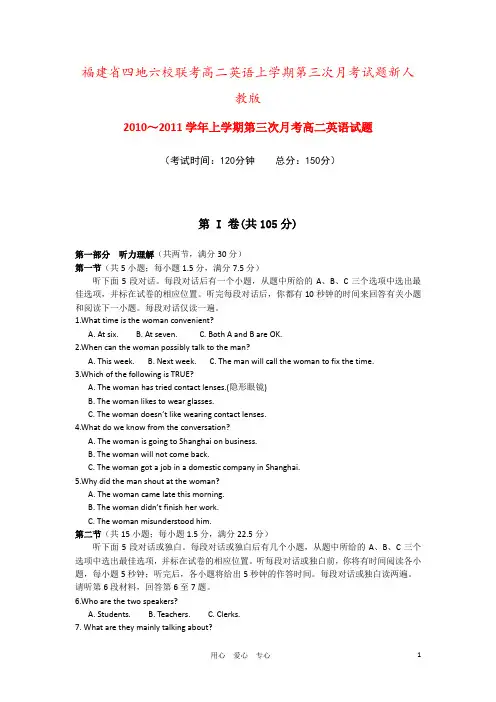
福建省四地六校联考高二英语上学期第三次月考试题新人教版2010~2011学年上学期第三次月考高二英语试题(考试时间:120分钟总分:150分)第 I 卷(共105分)第一部分听力理解(共两节,满分30分)第一节(共5小题;每小题1.5分,满分7.5分)听下面5段对话。
每段对话后有一个小题,从题中所给的A、B、C三个选项中选出最佳选项,并标在试卷的相应位置。
听完每段对话后,你都有10秒钟的时间来回答有关小题和阅读下一小题。
每段对话仅读一遍。
1.What time is the woman convenient?A. At six.B. At seven.C. Both A and B are OK.2.When can the woman possibly talk to the man?A. This week.B. Next week.C. The man will call the woman to fix the time.3.Which of the following is TRUE?A. The woman has tried contact lenses.(隐形眼镜)B. The woman likes to wear glasses.C. The woman doesn’t lik e wearing contact lenses.4.What do we know from the conversation?A. The woman is going to Shanghai on business.B. The woman will not come back.C. The woman got a job in a domestic company in Shanghai.5.Why did the man shout at the woman?A. The woman came late this morning.B. The woman didn’t finish her work.C. The woman misunderstood him.第二节(共15小题;每小题1.5分,满分22.5分)听下面5段对话或独白。
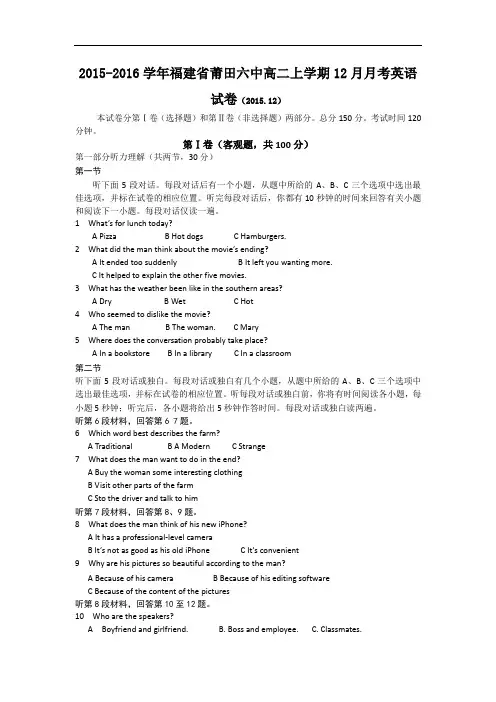
2015-2016学年福建省莆田六中高二上学期12月月考英语试卷(2015.12)本试卷分第Ⅰ卷(选择题)和第Ⅱ卷(非选择题)两部分。
总分150分。
考试时间120分钟。
第Ⅰ卷(客观题,共100分)第一部分听力理解(共两节,30分)第一节听下面5段对话。
每段对话后有一个小题,从题中所给的A、B、C三个选项中选出最佳选项,并标在试卷的相应位置。
听完每段对话后,你都有10秒钟的时间来回答有关小题和阅读下一小题。
每段对话仅读一遍。
1 What’s for lunch today?A PizzaB Hot dogsC Hamburgers.2 What did the man think about the movie’s ending?A It ended too suddenlyB It left you wanting more.C It helped to explain the other five movies.3 What has the weather been like in the southern areas?A DryB WetC Hot4 Who seemed to dislike the movie?A The manB The woman.C Mary5 Where does the conversation probably take place?A In a bookstoreB In a libraryC In a classroom第二节听下面5段对话或独白。
每段对话或独白有几个小题,从题中所给的A、B、C三个选项中选出最佳选项,并标在试卷的相应位置。
听每段对话或独白前,你将有时间阅读各小题,每小题5秒钟;听完后,各小题将给出5秒钟作答时间。
每段对话或独白读两遍。
听第6段材料,回答第6 7题。
6 Which word best describes the farm?A TraditionalB A ModernC Strange7 What does the man want to do in the end?A Buy the woman some interesting clothingB Visit other parts of the farmC Sto the driver and talk to him听第7段材料,回答第8、9题。
2015-2016学年福建省四地六校高二上学期第三次联考(12月)数学文试卷第Ⅰ卷 (选择题 共60分)一、选择题:本大题共12小题,每小题5分,共60分.在每小题给出的四个选项中,只有一项是符合题目要求的。
1、下列命题是真命题的为 ( ) A .若11x y=,则x y = B .若21x =,则1x = C .若x y =,= D .若x y <,则 22x y <2、双曲线22145x y -=的一个焦点坐标是( )A.(0,3)B.(3,0)C. (0,1)D. (1,0)3、如果方程221y x k+=表示焦点在y 轴上的椭圆,那么实数k 的取值范围是( )A. ()0,+∞B. ()0,2 C . ()0,1 D. ()1,+∞ 4、下列求导运算正确的是( )A .211)1(xx x +='+B .e x x 3log 3)3(⋅='C . 2ln 1)(log 2x x =' D .x x x sin 2)cos (2-='5、某单位有职工750人,其中青年职工350人,中年职工250人,老年职工150人,为了了解该单位职工的健康情况,用分层抽样的方法从中抽取样本 . 若样本中的青年职工为7人,则样本容量为 ( )A.7 B .15 C.25 D.35 6、200辆汽车通过某一段公路时,时速的频率分布直方图如右下图所示,则时速在 [50,70)的汽车大约有( )A.60辆 B .80辆 C.70辆 D.140辆7、在半径为1的圆中随机地撒一大把豆子,则豆子落在圆内接正方形中的概率为( ))A .π2B .π1C .π2D .π38、抛物线2y 4x =上的一点M 到焦点的距离为1,则点M 的纵坐标为( )A .1716 B .1516 C .78D .0 9、如图所示:为'()y f x =的图像,则下列判断正确的是( )①()f x 在(),1-∞上是增函数 ②1x =-是()f x 的极小值点③()f x 在()2,4上是减函数,在()1,2-上是增函数④2x =是()f x 的极小值点A .①②③B .①③④C .③④D .②③10、以下有四种说法,其中正确说法的个数为:( ) (1)“m 是实数”是“m 是有理数”的充分不必要条件; (2) “a b >”是“22a b >”的充要条件;(3) “3x =”是“2230x x --=”的必要不充分条件;(4)命题“32,10x x x ∀∈--≤R ”的否定是“32,10x x x ∃∈--≤R ” A. 0个 B. 1个 C. 2个 D. 3个11、若函数2)(3-+=ax x x f 在区间),1(+∞内是增函数,则实数a 的取值范围是 ( )A .),3(+∞B . ),3[+∞-C . ),3(+∞-D .)3,(--∞12、设1F 、2F 是双曲线2214y x -=的左、右两个焦点,在双曲线右支.....上取一点P , 使2OF OP =(O 为坐标原点)且1||PF λ=2||PF ,则实数λ的值为 ( )A .21B .3C .2D .2或21 第Ⅱ卷(非选择题 共90分)二、填空题:本大题共4小题,每小题5分,共20分,把答案填在答题卷的相应位置.13、甲乙两袋中各有大小相同的两个红球、一个黄球,分别从两袋中取一个球,恰有一个红球的概率是 .14、下面程序框图输出的结果是 .15、已知函数()f x 的图像在点(1,(1))M f 处的切线方程是2310x y -+=, 则(1)(1)f f '+= .16、若双曲线)0,0(12222>>=-b a by a x 的两条渐近线将平面划分为“上、下、左、右”四个区域(不含边界),若点()2,1在“上”区域内,则双曲线的离心率e 的取值范围是 . 三、解答题:本大题共6小题,共70分.解答应写出文字说明,证明过程或演算步骤.17、(本小题满分10分)已知0a >,设p:函数xy a =在R 上单调递减;命题q:方程22120.5x y a a +=--表示的曲线是双曲线...,如果“p ∨q ”为真,“p ∧q ”为假,求a 的取值范围。
福建省四地六校2015届高三英语上学期第三次月考试题(含解析)考试时间:120分钟总分:150分第一部分听力(共两节,满分30分)第一节(共5小题;每小题1.5分,满分7.5分)听下面5段对话。
每段对话后有一个小题,从题中所给的A、B、C三个选项中选出最佳选项,并标在试卷的相应位置。
听完每段对话后,你都有10秒钟的时间回答有关小题和阅读下一小题。
每段对话仅读一遍。
1.What is the woman doing recently?A. She is skipping breakfast.B. She is losing weight.C. She is learning how to cook.2.What’s the most possible relation between the two speakers?A. Husband and wife.B. Doctor and patient.C. Neighbors.3.When does the man start work in London?A. At 730 am.B. At 830 am.C. At 630 am.4.When will the man go to the United States?A. The day after tomorrow.B. Tomorrow.C. Next month.5.Where is the conversation most probably taking place?A. In the drugstore.B. In the post office.C. In the hotel.第二节(共15小题;每题1.5分,满分22.5分)听下面5段对话或独白。
每段对话或独白后有几个小题,从题中所给的A、B、C三个选项中选出最佳选项,并标在试卷的相应位置。
听每段对话或独白前,你将有时间阅读各个小题,每小题5秒钟;听完后,每小题将给出5秒钟的作答时间。
2015-2016学年福建省四地六校高二上学期第二次联考(11月)英语(考试时间:120分钟总分:150分)第Ⅰ卷(选择题共92分答题卡计82分)第一部分听力(共两节,满分30分)第一节(共5小题;每小题1.5分,满分7.5分)听下面5段对话。
每段对话后有一个小题,从题中所给的A、B、C三个选项中选出最佳选项,并标在试卷的相应位置。
听完每段对话后,你都有10秒钟的时间来回答有关小题和阅读下一小题。
每段对话仅读一遍。
1.Who is Mr. White?A. A salesman.B. A repairman.C. A professor.2.Where does the woman work?A. At a hotelB. At a restaurant.C. At a department store.3.What time does the man think they will leave?A. At 7:15.B. At 7:35.C. At 7:25.4.What does the man mean?A. He liked the work very much.B. He didn’t like the work because it wasn’t interesting.C. He didn’t like the work so much because it kept him working long hours.5.What was the mark the woman got in her exam?A. 95B. 90C. 98第二节(共15小题;每小题1.5分,满分22.5分)听下面5段材料。
每段材料后有几个小题,从题中所给的A、B、C三个选项中选出最佳选项,并标在试卷的相应位置。
听每段材料前,你将有时间阅读各个小题,每小题5秒钟;听完后,各小题将给出5秒钟的作答时间。
每段材料读两遍。
“华安、连城、永安、漳平一中,龙海二中,泉港一中〞2013-2014学年上学期第三次月考高二英语试题〔考试时间:120分钟总分:150分〕第1卷〔选择题共115分〕第一局部听力 (共两节,总分为30分)第一节 (共5小题;每一小题1.5分,总分为7.5分)听下面5段对话。
每段对话后有一个小题,从题中所给的A、B、C三个选项中选出最优选项,并标在试卷的相应位置。
听完每段对话后,你都有10秒钟的时间来回答有关小题和阅读下一小题。
每段对话仅读一遍。
1.How is the weath er in the woman’s opinion?A. Warm.B. Cold.C. Hot.2. What does the man mean?A.He already has plans.B. The woman should decide.C.He will make a reservation.3. Why did the man go to Beijing?A. To visit his parents.B. To have an interview.C. To receive job training.4. What are the two speakers talking about?A. What to take up as a hobby.B. How to keep fit.C. How to handle pressure.5. What will the man do first?A. Tidy his room.B. Go on a picnic.C. Wear clothes.第二节 (共15小题;每一小题1.5分,总分为22.5分)听下面5段对话。
每段对话后有几个小题,从题中所给的A、B、C三个选项中选出最优选项,并标在试卷的相应位置。
听每段对话前,你将有时间阅读各个小题,每一小题5秒钟;听完后,各小题将给出5秒钟的作答时间。
“四地六校”联考2015-2016学年上学期第三次月考高二英语试题(考试时间:120 分钟总分:150 分)第Ⅰ卷第一部分:听力(共两节,满分30分)第一节(共5小题;每小题1.5分, 满分7.5分)听下面5段对话。
每段对话后有一个小题,从题中所给的A、B、C三个选项中选出最佳选项,并标在试卷的相应位置。
听完每段对话后,你都有10秒钟的时间来回答有关小题和阅读下一小题。
每段对话仅读一遍。
1. Who is answering the phone?A. Elaine.B. Allan MacFarlane.C. Bob Harris.2. What happened to the driver?A. He ran into a bicycle.B. He drove too slowly.C. He ran into a tree.3. What can we learn from the dialogue?A. They like summer.B. They don't like summer.C. They think hot weather is nicer.4. When should Susan go to meet Professor Brown?A. At 9:30.B. At 10:00.C. At 10:30.5. What does the woman plan to do this afternoon?A. Buy a new pair of glasses.B. Shop for some clothes.C. Go to her classes.第二节(共15小题;每小题1.5分,满分22.5分)听下面5段对话或独白。
每段对话或独白后有几个小题,从题中所给的A、B、C三个选项中选出最佳选项,并标在试卷的相应位置。
听每段对话或独白前,你将有时间阅读各个小题,每小题5秒钟;听完后,各小题将给出5秒钟的作答时间。
每段对话或独白读两遍。
听第6段材料,回答第6至8题。
6. Where does the conversation most likely take place?A. In a restaurant.B. In a hotel.C. On the phone.7. When does the restaurant stop serving lunch?A. At 1 p. m.B. At 2 p. m.C. At 3 p. m.8. How many people will come with the woman for lunch?A. One.B. Two.C. Three.听第7段材料,回答第9至11题。
9. What are the speakers talking about?A. Buying a car.B. Choosing a gift.C. Using a computer.10. What's the relationship between the two speakers?A. Husband and wife.B. Professor and student.C. Salesman and customer.11. What do we know about the person mentioned by speakers?A. Maybe he likes something expensive.B. He is surely over sixty years old.C. He must be fond of learning.听第8段材料,回答第12至14题。
12. What's the probable relationship between the speakers?A. Close friends.B. Strangers.C. Colleagues.13. What's the woman going to do?A. She is going to work in a post office nearby.B. She wants to do some exercise.C. She intends to post a letter.14. What does the woman have to do to reach the destination?A. She has to find the entrance inside a building complex.B. She has to turn right to the main street.C. She has to register her letter.听第9段材料,回答第15至17题。
15. What is the present condition of hotline like today?A. Poor.B. Popular.C. Rare.16. What is the purpose of starting the hotline for teenagers?A. To gain the belief of teenagers.B. To make teenagers study hard.C. To protect teenagers' rights.17. What does the woman think of the hotline for teenagers?A. It won't last long.B. It will be useful.C. It will save many lives.听第10段材料,回答第18至20题。
18. What is the purpose of the passage?A. To report on the growing middle class of China.B. To introduce a US company.C. To analyze the current market.19. How many new babies does China have every year?A. 11 million.B. 20 million.C. 21 million.20. Which of the following is true?A. The toys made by China are of poor quality.B. China has a lot of high-quality toys exported.C. China is behind in toys-making.第二部分阅读理解 (共两节,满分32分)第一节(共11小题;每小题2分,满分22分)阅读下列短文,从每小题后所给的A、B、C、D四个选项中,选出最佳选项。
AI went online to check if my pay was in my bank account. To my amazement I discovered that not only had I been paid, a company I’d never worked for had also paid me! I knew I’d have been beside myself if my own salary was not in my account, so I tried to get the money back to the right person. Easier said than done.The bank couldn’t help as it wasn’t a bank problem. The human resources department at the company that paid me was unable to help as I di dn’t have enough details. I rang the bank again. Thankfully I had a sympathetic call operator who gave me a name, so I again rang the company “Daniel” worked for.I expected the bank would contact me to arrange to take the money from my account and repay Daniel. I heard nothing for a month and the money remained in my account when Daniel called, explaining he’d tried to get back his money but had been unsuccessful as neither the bank nor his company felt it was their error. He had rung to ask if I could speak to the bank, but after chatting for a few minutes we realized we could probably fix this problem ourselves.We decided I would take the money from my account and he would pick it up from me. Due to my busy job I was unable to meet Daniel personally but he left me a lovely bottle of wine in exchange for what was rightfully his. I never had any intention of keeping Daniel’s pay but red tape(繁琐手续) made it difficult to do the right thing. It all came down to two people being able to do what a huge bank and a large company couldn’t do—admit a mistake has occurred and fix it.21. What was the attitude of the author towards the extra money in his bank account?A. He didn’t know what to do with it.B. He felt lucky to get it.C. He thought of keeping it for himself.D. He wanted to return it to the right person.22. The underlined phrase “beside myself”(inParagraph1) probably means___________.A. very fortunateB. very angryC. really thankfulD. at ease23. How was the problem solved in the end?A. The author and Daniel solved the problem themselves.B. It cost Daniel a lovely bottle of wine to get back his money.C. The author gave the money back to the company.D. The call operator offered to solve their problem.24. From the passage we can infer that___________.A. the bank could solve the problem soon and easily with the red tapeB. some large organizations usually have troublesome official rulesC. Daniel didn’t know the error before he contacted the authorD. the company gave the wrong account to the bankBMonthly Talks at London Canal MuseumOur monthly talks start at 19:30 on the first Thursday of each month except August. Admission is at normal charges and you don’t need to book. They end around 21:00.November 7thThe Canal Pioneers, by Chris Lewis. James Brindley is recognized as one of the leading early canal engineers. He was also a major player in training others in the art of canal planning and building. Chris Lewis will explain how Brindley made such a positive contributi on to the education of that group of early “civil engineers”.December 5thIce for the Metropolis,by Malcolm Tucker. Well before the arrival of freezers, there was a demand for ice for food preservation and catering, Malcolm will explain the history of importing natural ice and the technology of building ice wells, and how London’s ice trade grew.February 6thAn Update on the Cotswold Canals, by Liz Payne. The Stroudwater Canal is moving towards reopening. The Thames and Severn Canal will take a little longer. We will have a report on the present state of play.March 6thEyots and Aits-Thames Islands,by Miranda Vickers. The Thames had many islands. Miranda has done a review of all of them. She will tell us about those of the greatest interest.Online bookings:/bookMore info: /whatsonLondon Canal Museum12-13 New Wharf Road, London NI 9RT www. canalmuseum.mobiTel:020 7713 083625.When is the talk on James Brindley?A. November 7th.B. March 6th.C. February 6th.D. December 5th.26. What is the topic of the talk in February?A. The Canal Pioneers.B. Ice for the Metropolis.C. Eyots and Aits-Thames Islands.D. An Update on the Cotswold Canals.27. Who will give the talk on the islands in the Thames?A. Chris Lewis.B. Malcolm Tucker.C. Miranda Vickers.D. Liz Payne.CSome people find that they cannot pay attention and have a tendency to daydream when they have gone through three or four pages without remembering a word. One cure for this is to stop reading and seek some distraction(分心)on purpose, then return to what you were reading with renewed attention.Perhaps the best general advice is: Do not mix play and work. When it is time to work, work hard. Devote yourself to your task and keep going as long as you can give the job full attention. You should be able to read for at least an hour or two without interruption. When you begin to feel that you are not getting as much out of your reading as you ought to, rest for a while. But if there is more work remaining to be done, make the rest period short. It is surprising how quickly you can refresh your mind by turning to something entirely different for a few minutes.What is critical is your reading speed, however. If you read too slowly you give your brain the chance to wander on to something more interesting —especially if what you are reading is boring! So learning to read fast with high levels of concentration and comprehension is a far better use of time than wandering along at a slow reading speed, allowing all sorts of other thoughts to distract you.If this suggestion does not solve your problem, there is another thing you can do. Form the habit of reading in the same place each time you read. Make this place, wherever it may be, in the office or at the desk in your study, a place for "concentrated" reading. Write your reports and fill out your crossword puzzlessomewhere else. After you have tried this for a week or two, you will find that your habits will begin to work for you.28.If you can’t put your heart into what you do, you should _______ .A. give it upB. turn to othersC. play while workingD. do something different29.The main idea of the third paragraph is that _______.A. reading is a boring job for us to doB. reading slowly is an interesting activityC. speed reading prevents us from distractingD. the difference between fast and slow reading30.Which of the following can help you to improve the effect of your readingaccording to this passage?___________a. Having a rest.b. Reading fast.c. Reading in the same place.d. Reading slowlye. Reading carefullyA. b, c, dB. a, b, cC. c, d, eD. a, d, e31.This passage is probably written for those who _______.A. are good at reading and speakingB. like reading everywhere at homeC. are tired of reading and writingD. are easy to distract while reading 第二节(共5小题;每小题2分,满分10分)根据短文内容, 从短文后的选项中选出能填入空白处的最佳选项.选项中有两项为多余选项.Are you simply moving through your day without fully living? I think many of us have done this. Everyone wants to fully live every day. 32 So I’ve decided to share with you some ways to help you enjoy every moment.Sit in the morning. When you wake up, in the quiet of the morning, sit on the floor. I often use this opportunity to stretch and I feel every muscle in my body. 3334 I like to take breaks from work, and go outside for a slow walk. Pay attention to your breathing, to everything around you, to the sounds and light of objects.Read in silence. Find a quiet time and a quiet place, and read a good novel.Have no television or computers on nearby. 35 It might seem difficult to let your mind move from the present into the time of novel, but it’s a great patience in focus. Also, I love a good novel more than almost anything else.Look at someone in a grateful way. 36 If you want, you can tell that person how thankful you are to him.A. Walk slowly.B. Work with force.C. And just put yourself in the world of the novel.D. It’s a way of building something good into your life.E. But this is easier said than done.F. Find someone you care about and be grateful for his existence.G. I also just sit, and focus on my breathing going in and out.第三部分英语知识运用(共一节, 满分30分)第一节完形填空(共20小题;每小题1.5分,满分30分)阅读下面短文,掌握其大意,从短文后所给的四个选项(A、B、C和D)中,选出可以填入空白处的最佳选项。